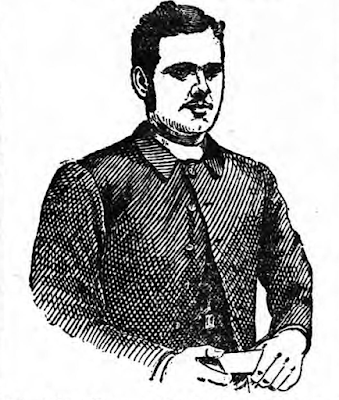Note: R. L. Vaughan posted this quote to comments on the WM 245 youtubevideo, and I shared on my twitter @Riddle1689 and thought I’d post here too.
Scottish Presbyterian Ebenezer Ritchie on Ps. 12:6-7 and the
preservation of Scripture (1868):
“Before passing from this subject, I would advise, in reference to the
canon of Scripture, that you meddle not with them that are given to change. We
might reason, a priori, from the regard God has to His Word, and the important
ends intended by it, as a perfect and infallible record and rule, that it is so
much the object of His care and superintending providence that no book of
Scripture has perished, and even that no words of God contained it have been
lost.
‘The words of the Lord are pure words: as silver tried in a furnace of
earth, purified seven times. Thou shalt keep them, O Lord, thou shalt preserve
them from this generation for ever.’
But the question occurs, where are the original inspired words of
Scripture to be found? We answer, In the received Hebrew and Greek texts, with
their marginal readings, which are the prototype of our English version, and of
almost all vernacular translations of the Scriptures at the present time.”
From The Original Secession Magazine, Rev. E. Ritchie, Address to the
Students of Divinity of the United Original Secession Church, Volume VIII, No.
XII, November 1868, p. 734.
JTR

8 comments:
Thank you for this very interesting extract! When I was a lad in Scotland, I was taught by Baptists and Brethren and Presbyterians that the authoritative original texts were the received Hebrew - best exhibited by Ginsburg - and the received Greek - best exhibited by Scrivener - and that attention should be paid to the marginal notes (including their variants); and that the authoritative English text was the Authorised (King James] Bible, with the Translators’ marginal notes (including their variants). The men who so taught me ranged from ordained ministers to miners and millworkers and farmers - who (regularly) knew Greek and (often) knew . Hebrew. They were not all against light “revision” - ie, a replaced reading here and there (eg, Revelation 22:19), or a replaced translation here and there (eg, 1 Corinthians 13). There were even some who would not have objected to an additional revision, for helping purposes only, of the grammar (eg., “cometh”). An alternative or an additional margin, mooted by many in the nineteenth century but never executed, was also a popular option : this seems to be the option now done (begun?) by the Trinitarian Bible Society in its excellent Westminster Reference Bible.
AT, thanks for these insights. Interesting how generations past had little trouble using the AV and also how they had a more sophisticated knowledge of the Bible across many walks of life.
BTW, are you the AT who has some survey work on translation usage. Had someone mention this to me. If you have an article on this please send to me.
JTR
Guilty as charged! I have disclosure restrictions, but I’ll be able to let a chosen few something very soon, Have you seen the Facebook NT Criticism Group? You don’t have to be a member, but it’s a publically-viewable group. Please urge TBS to continue to enlarge the margin of the Westminster Reference Bible, to include more notes and glosses!
Thanks! I'll check it out.
Took a quick look. Question, in your US calculations, you list KJV, NKJV, ESV, and NIV as the "top 4" but then you say the NIV is 8 and the NLT 10. Why is the NIV in the top 4 and not the NLT for US?
Also when and where will this be published?
The NIV is where it was for the previous years, and the NLT likewise, for easy comparison and because it’s not yet certain that NLT will displace NIV (though it seem probable). I hope to get something to you within the next week!
Well, there may be seven, but there’s also three!
“…at the mouth of two or three witnesses the matter shall be established…”
Witness 1. 1539. Coverdale 2nd Bible. Royal assent received - ie, first authorised version
Witness 2. 1568. The Bishops’ Bible. Royal assent received - ie, second authorised version
Witness 3. 1611 Authorised Version. Permitted/commanded/provisioned by King James to replace existing translations
Ie, without doubt, the third and the only, AUTHORISED VERSION of the Realm
“ Where the word of a king is, there is power; and who may say unto him, ‘What doest thou?’. “
Post a Comment